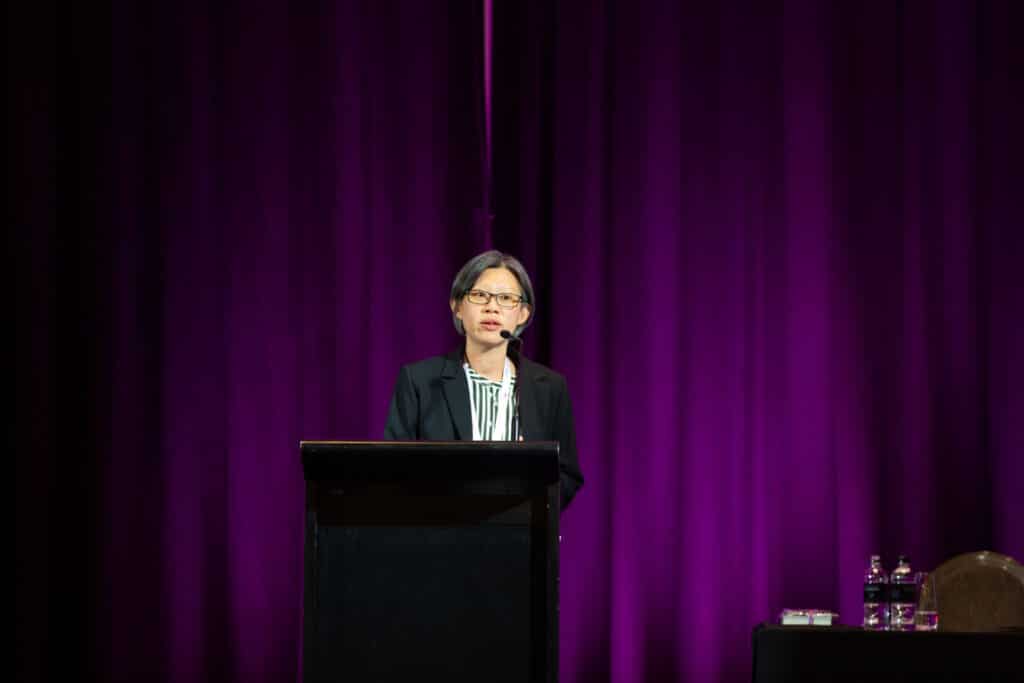Dr Cindy Tan is a dietitian working in a cancer survivorship clinic at the University of Sydney, who is researching lifestyle interventions to improve diet and exercise for cancer survivors, as well as the psychosocial aspects of cancer recovery.
We spoke with Dr Tan about the importance of dietary considerations for patients with early-stage breast cancer.
“The topic of dietary consideration is important because obviously diet is a very significant topic for our breast cancer survivors, and ultimately everyone wants to improve their diet. This is one of the reasons why I would like to focus on this topic, and I’m hoping that we can eventually come up with a lifestyle intervention that can improve the diet and exercise levels in breast cancer patients to improve their quality of life and clinical outcomes.”
Why is it important for someone to consider their diet when diagnosed with breast cancer?
“Well, we know that a good diet can improve one’s health in general, and everyone, even though they may not say it, but everyone knows that a good diet is important. We have lots of people trying to improve their diet since receiving a diagnosis.”
“At the survivorship clinic, we ask the patients who come through after they have completed their treatment, have you made any dietary changes since receiving the cancer diagnosis? And we found that 58 percent of them say that they have made some form of dietary change. And at least on average, this will equate to two dietary changes per patient, but it can range from one to seven.”
“So, everyone wants to do something about it, and I guess diet is something that people feel that they can control, because it’s within their capability. From a research point of view, we know that good nutrition can improve mental wellbeing, as well as provide nutrients that can support a person to go through their cancer treatment.”
“There is lots of research that has shown that an unhealthy diet can increase the risk of cancer or cancer recurrence, so I guess there are a few aspects of it that are important, and that people should consider about practicing good dietary habits.”
Listen to the Podcast
We spoke with Dr Cindy Tan about dietary considerations for patients with early-stage breast cancer.
Do dietary considerations for patients with early-stage breast cancer differ to those with advanced breast cancer?
“So, the short answer is no. I guess when people talk about diet, we would usually ask what they are thinking because at the end of the day, when we talk about diet, often people have the concept of certain food items, like functional food, or certain food groups they should have more or less of.”
“But it’s really about the dietary factors, so how it differs between people with early-stage cancer and people with advanced cancer. So, during treatment time regardless of whether it is early-stage or advanced, you really want to have a good balanced diet so that you’re, you are getting all the nutrients that body needs to support you to get through the treatments.”
“For people with early-stage cancer, then obviously the focus will be after treatment stage, to have a balanced diet and prevent further weight gain, and to remain within a healthy weight range to reduce the risk of cancer recurrence. Whereas for people with advanced cancer, maybe they are still living with cancer, but it’s still important to maintain a good balanced diet and prevent malnutrition, because there are other aspects and things we need to consider as well.”
“So, in summary, there shouldn’t be any big change between the two. When someone is going through cancer treatment, they may require something different, particularly if they are experiencing some symptoms or other conditions requiring them to restrict certain food or having more of a certain type of food.”
How important is nutrition and exercise for someone who has recieved a breast cancer diagnosis?
“I think it is very important to have a good diet and be physically active, regardless of the stage of cancer. So, we have enough evidence to support the benefits of exercise during treatment, after treatment, even for people living with cancer.”
“We certainly know that a good balanced diet can help and is beneficial during treatments and even after treatments for people with living with cancer. I think that goes hand in hand. It’s not something that you can just do one or the other to get the maximum benefits. Certainly, for some people who cannot perform certain types of exercise, they can only focus on the diet, which is still important.”
“But when we are talking about the maximum benefits, it really comes from a combination of exercise and nutrition.”
What are your hopes for the future of breast cancer research?
“I’m hoping that we’ll be able to get some model of care that provides supportive care to all patients and is sustainable. So, for a lot of the research being done in this space, once the funding ceases, you don’t really see that being translated into clinical practice.”
“So, I’m hoping that there will be some sort of lifestyle intervention support for our patients in clinical setting, not just in the research setting. But I guess it’s important to find out what would be the best intervention for each patient. So, we must go by stages.”
“At the moment I’m hoping that our phase II intervention trial can prove that it’s feasible. And I’m hoping that this sort of similar concept can sustain it and go into phase III and then later in clinical practice.”
Support Us
Help us to change lives through breast cancer clinical trials research



